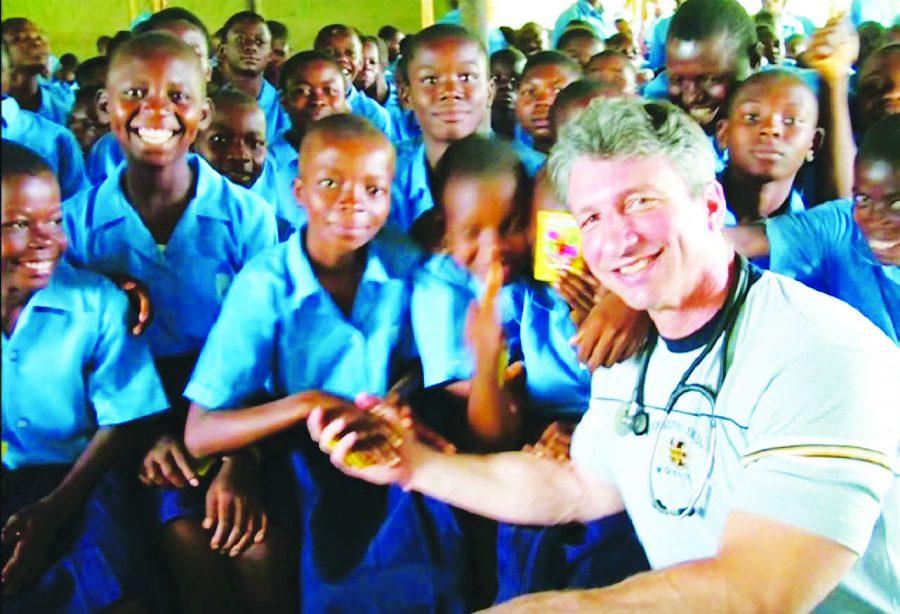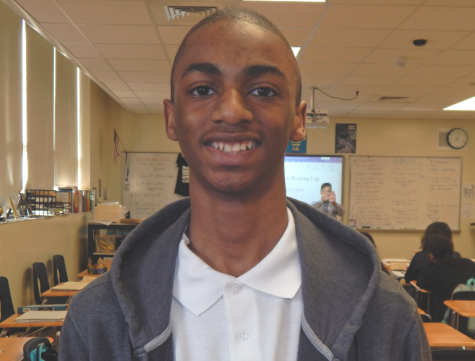Meet the Medic
Miami High Alumnus Dr. Patino went from Sting to surgeon.
Practice what you preach! There’s one Miami High alumni who not only lives by these words but has the results to show it. With over 25 years of clinical practice, class of ‘73 Miami High alumnus Dr. Frank Patino is a surgeon and nutritionist molded by his experiences and true to his roots.
Career
Dr. Patino is a practicing medical doctor in Livonia, Michigan, certified in sports, internal, and emergency medicine. Earlier in his career, he did a lot of work in the emergency room. He is the founder and CEO of Renaissance Age Management Institute, Patino Laboratories, and the Health Help Project, a nonprofit charity organization that donates to countries in need.
Dr. Patino specializes in nutritional counseling and has his own medical plan, “The Patino Diet,” which promotes a healthy lifestyle and losing weight. He himself followed this lifestyle and got great results after just two months of using it: he dropped 20 pounds, lost 11% body fat, and gained a lot of muscle in the process. He has even worked with several fighters including Mark “The Hammer” Coleman and Eric Prindle.
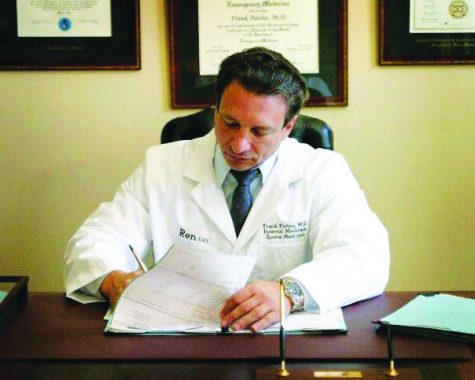
He published a book on this diet titled The Age of Globesity: Entering the Perfect Storm. “I don’t sell pills, products, kits, or potions,” he said. “I let people make good life and nutrition choices.”
Throughout his career, Dr. Patino has been granted several awards for his hard work and dedication in the medical field. These include the William E. UpJohn Award from Pfizer Pharmaceuticals, the Recognition Award for service in Nicaragua, and the Humanitarian Award for his work done in the Dominican Republic.
What Dr. Patino likes best about being a doctor is the ability to help others. Whatever the issue, there is some way to assist someone. “It’s best when you can help people help themselves,” he said. “Being in the medical field is hard work, but it’s rewarding.”
School Spirit
Dr. Patino remains a diehard Stingaree to this day. “Miami High is unmatched in its beauty,” he said. “It has character, good education, and even better sports.”
Even before coming to Miami High, Dr. Patino involved himself in it and had a lot of spirit. “I bought tickets to their football games and worked out there from time to time back when I was in Shenandoah Junior High,” he said. “I even had a scrapbook about the place!”
The young Dr. Patino was very athletic in his school years. He was capable in many sports including baseball and track, but he ultimately chose to play football in high school where he was a fullback.
Believing at the time that his future was in sports and not academics, he put an emphasis on football, and as a result, did not push himself with his schoolwork. However, everything changed when he broke his ankle while playing.
“That ended my dreams of becoming any type of ballplayer, which actually turned out to be the best thing that ever happened to me,” Dr. Patino said. In the years that followed, maturity began to set in, and he worked harder in school.
Dr. Patino has fond memories of his time at Miami High. He made friends on the football team, with whom he also attended a Christian youth group. As for teachers, he appreciated how they were friendly and treated him with respect, which is all he could ask for. He got along well with Coach Beck, the football coach at the time and the one who put him on the team in the first place.
College Life
After attending Florida Bible College for two years, Dr. Patino realized what he wanted to do in life. “At the end of those two years, it dawned on me that I wanted to go into the medical field,” he said. “I switched fields and started an undergraduate major in biology.”
His interest in the field led him to buy a physiology book with descriptions of the parts of the human body. Whenever he wasn’t busy, he would pick up the book and get excited while learning. “The whole time I was reading it,” Dr. Patino said, “I was thinking: If I can understand this, I have it in me to be a doctor.”
He attended Miami Dade College North Campus for two years and got almost all A’s. He then applied to UM, got accepted into their pre-med program, and majored in biology and chemistry. Despite the challenge, his grades were stellar, and he graduated in 1983. Following that, he attended medical school at UF and graduated from there in 1987.
If he could change the past, Dr. Patino would have taken a course in business and economics. “School doesn’t prepare you for the real world of business,” he said. “To be a good doctor you have to manage your money well. Doctors, being in the top 0.5% of wage earners in the world, sometimes don’t know what to do with their money or have business sense.”
Jobs and In-Betweens
The path to becoming a doctor was no walk in the park. In order to get his education, Dr. Patino had to constantly juggle both school and work.
In the phase between Bible College and becoming an undergraduate at Miami Dade, Dr. Patino took a job as a lifeguard at John U. Lloyd State Park.
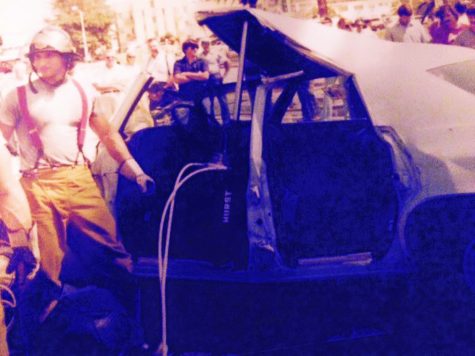
Life next led Dr. Patino to firefighting. Near the time when he began to attend UM, he worked full time at the Miami Beach Fire Department. Initially, he was there as a firefighter and first responder paramedic — a combination he enjoyed because it allowed him to both help people and get more insight in the medical field.
In the years that followed, Dr. Patino was the physical training instructor for the fire department’s rookies. He did this by making a deal with the chief: he would take the position for no pay as long as he was given enough time off to go to school. “I was interested in education and not the money,” he said.
For the next 6 years, he worked there full time. He reluctantly retired from the fire department after his graduation from UM and acceptance into the UF College of Medicine.
In between being a student and firefighter, Dr. Patino learned to fly. He took lessons at Opa-locka Airport and fell in love with piloting. His flight instructor allowed him to use his airplane whenever it wasn’t being rented, allowing him to take occasional trips for little cost. In Ft. Lauderdale, his friend had an avionics business where Dr. Patino used the plane to deliver airplane parts and transport aircraft mechanics.
Charity Work
In 1995, with the help of his father and brothers, Dr. Patino created the Health Help Project, a nonprofit organization that donates medicine and goods to countries in need. Word spread of the organization, and soon enough, it was getting donations from several hospitals.
It started off with sending supplies to Cuba. Soon after, they got a letter from the Dominican Republic requesting assistance.
Dr. Patino visited the hospitals there, and then veered into the nearby village of Canastica, where he immediately saw the problem: a trench with raw sewage was in the middle of it. The people in the village were devastated with disease and looked like they had never seen a doctor before.
He wasn’t prepared for consultations, but he couldn’t help but notice that one of the kids had a club foot deformity. Dr. Patino took down the boy’s information, and when he went back to America, he asked the hospital in Michigan where he was working if he could bring the boy over for a surgery.
“In Third World countries, if you have a deformity, it’s difficult to survive,” he said. “They don’t have a safety net there like we have here in America.” The hospital accepted, and the boy was brought over and sent back home after being successfully treated.
After that, there were five more kids from the Dominican Republic with deformities who came to the Michigan hospital for treatment; one of them was a girl named Marisella. She had a club foot as well, and life was a struggle for her. She lived in a wooden shack with no electricity or water and didn’t go to school because other kids would make fun of her. As a result, she didn’t know how to read.
A foster family took her in and homeschooled her for about 6 months while she was in Michigan, and she was given time to adapt. Eventually, the surgery was done, and her club foot was cured. She could then walk like never before, read at a third grade level, and do simple things she could not do before such as put on shoes — she was a new woman.
In between all of this, Dr. Patino took a trip to Nigeria for 11 days and gave help to the people there. “It was primitive,” he said. “There was no electricity and everyone was doing lots of hard work all day. The lines to get treatment were never short.” At the end of his stay, he was made Honorary Chief Ebo of their tribe and had a big ceremony for all of his contributions and service.
Dr. Patino learned a lot from his experiences with the Health Help Project. “One thing that depressed me as a physician when going to Third World countries is seeing a ton of people I couldn’t help. However, when you help individual kids, it’s a great feeling. I feel like I’m able to make a difference even if it’s small,” he said.
Going through all these missions also put his life into perspective. “Looking at these kids makes me think,” he said. “I grew up in Cuba, and if my family stayed there, I would have grown up in bad conditions and poverty because we would have had nothing. I saw I was fortunate, and those children weren’t. Realizing that behooves me to reach out and do good.”
Personal Life
Dr. Patino was born in Havana, Cuba, where he lived on a giant 6,000-acre farm owned by his family. He led a carefree life there and had fun playing with the farmers’ kids. His father was very generous and treated the farmers there with respect and gave them proper housing. Not only that, but he also built a school on the farmland so all of the children there could get an education.
When Dr. Patino was only 6 years old, his father was imprisoned by the
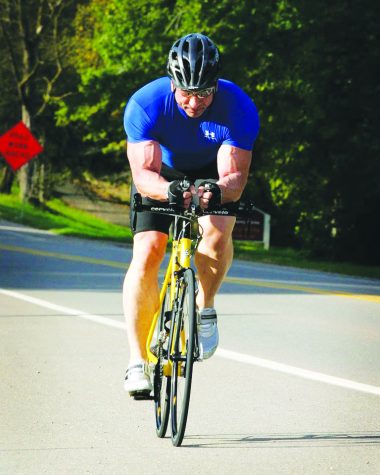
Cuban government. He, his five siblings, and his mother all had to leave the country with only the clothes on their backs.
They came to Florida and were among the first wave of Cuban immigrants to arrive here. It was hard to adapt because of the language barrier, but they managed to learn English despite the difficulty, and he and his siblings attended school while his mother found work. They were all very close to one another, and his older siblings were very helpful.
After five years of being in prison, his father was released and came to America. He was determined to find employment and support his family despite his hardships.
“My dad did the right thing, regardless of the consequences, instead of taking the easy road,” he said. “From my mom, I learned that to be successful in life, you have to achieve it. I strove to be like them.”
Dr. Patino now lives in Livonia, Michigan, with his wife and three children. His hobbies include going to the gym, bike riding, and going to the park. He enjoys traveling, but has not done much of it recently because of his demanding career. “I love this country and my God,” he said, “and we live in an extraordinary time and place.”


